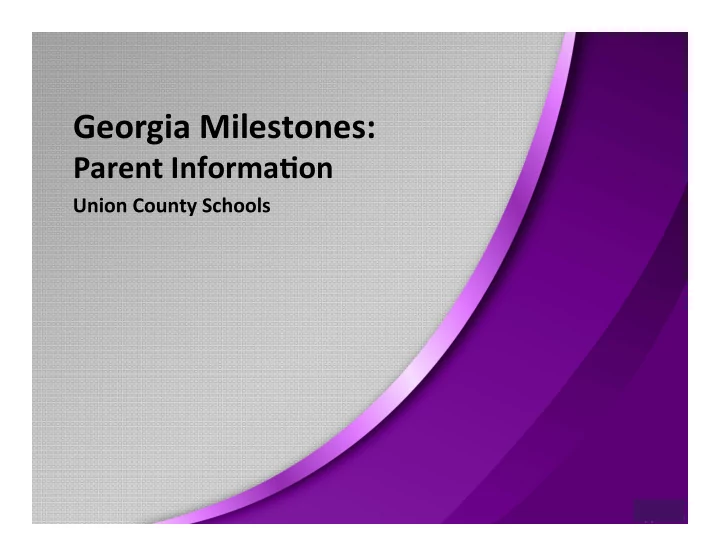

Georgia Milestones: Parent Informa3on Union County Schools
Assessment Overview • Both federal and state law require schools to annually assess ALL enrolled students. • The Georgia Milestones fulfills this mandate. • Neither federal of state law contain provisions for allowing parents to “opt-out.” • All students must be offered an opportunity to test.
Assessment Overview
Assessment Overview • Comprehensive summaGve assessment system • EOG: End-of-Grade Assessment for 3 rd —8 th • EOC: End-of-Course Assessment for 9 th —12 th • Content Areas – English Language Arts – MathemaGcs – Science – Social Studies
Assessment Overview • Aligned to the Common Core Georgia Performance Standards – Criterion referenced test – Contains 20 norm-referenced items • Informs promoGon/retenGon in grades 3, 5, and 8 • Allows for accommodaGons for students based on either an approved IEP or 504
Assessment Purpose • Measures student learning – By content – By domain – Compared to peers • Measures student readiness according to: – Achievement level – Numerical representaGon • Assess students preparaGon toward the College and Career Readiness
Assessment Purpose • Accountability/EvaluaGon – Teacher – Grade-level – School – System – State • Public awareness and transparency
Assessment Layout • Selected Response • Constructed Response • Open-ended Response – Constructed Response – Essay • 20 NaGonally Norm-referenced Items
Assessment Layout
Assessment Layout
Assessment Layout
Assessment Layout • www.gaexperienceonline.com
Assessment AdministraGon • Scheduled to begin April 25 th • Nine-day tesGng window • Nearly 100% online administraGon • RotaGng schedule • Four Achievement Levels – Beginning Learner – Developing Learner – Proficient Learner – DisGnguished Learner
Assessment AdministraGon • Day One: English/Language Arts • Day Two: WriGng • Day Three: MathemaGcs • Day Four: Science • Day Five: Social Studies
Assessment PreparaGon • Provide a Gme and place for your child to complete any homework each day. • Spend Gme reviewing homework and engage them in conversaGons about the material. • Encourage regular study as opposed to “cramming.” • Speak to your child about any of his/her tesGng concerns without overemphasizing the outcome or discounGng his/her feelings.
Assessment PreparaGon • Make sure your child gets plenty of sleep. • Provide a high-quality breakfast and lunch. • Allow for opportuniGes to “unwind.” • BE POSITIVE about what your child does well. • Remind your child how prepared he/she is. • Maintain realisGc and aaainable goals. • Do Not communicate that perfecGon is expected.
Post Assessment • Ask one or two general quesGons about the test, such as “how did it go?” • Help your child keep the tesGng in perspecGve. • Speak with your child about his/her results in a posiGve manner. • Understand your child’s results.
Recommend
More recommend